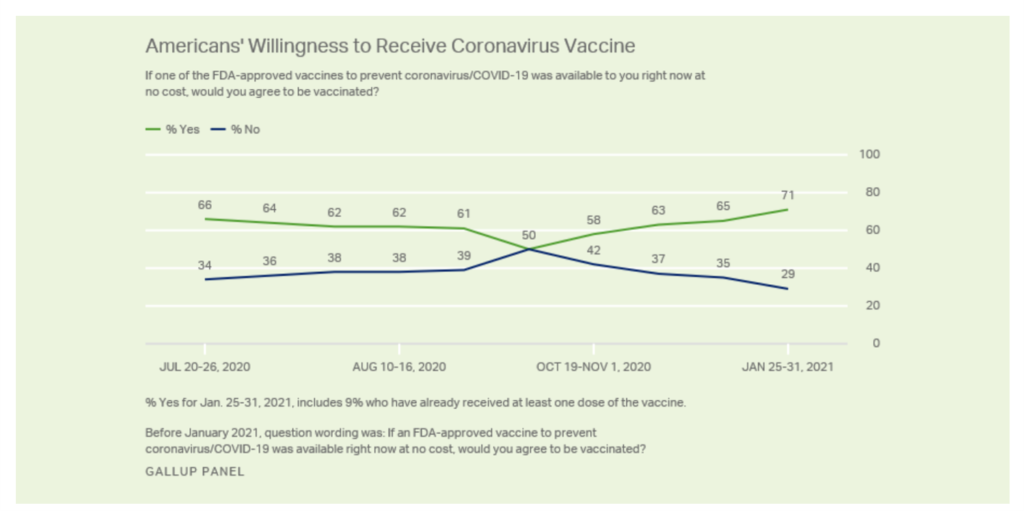 Seven in 10 U.S. adults are willing to be vaccinated, and they’re not happy about the process in getting their jab, according to Gallup’s poll taken in the last week of January 2021.
Seven in 10 U.S. adults are willing to be vaccinated, and they’re not happy about the process in getting their jab, according to Gallup’s poll taken in the last week of January 2021.
The proportion of Americans willing to receive a COVID-19 vaccine has steadily grown since October 2020, which fell to a mere 50% of folks keen to get the shot. That percentage has risen to 71% as of February 1 2021, as the first line chart shows the reversal in public embrace for vaccination against the coronavirus.
Now that most people in the U.S. welcome the opportunity to be vaccinated, most people are dissatisfied with the process of distributing, scheduling, and receiving their shot.
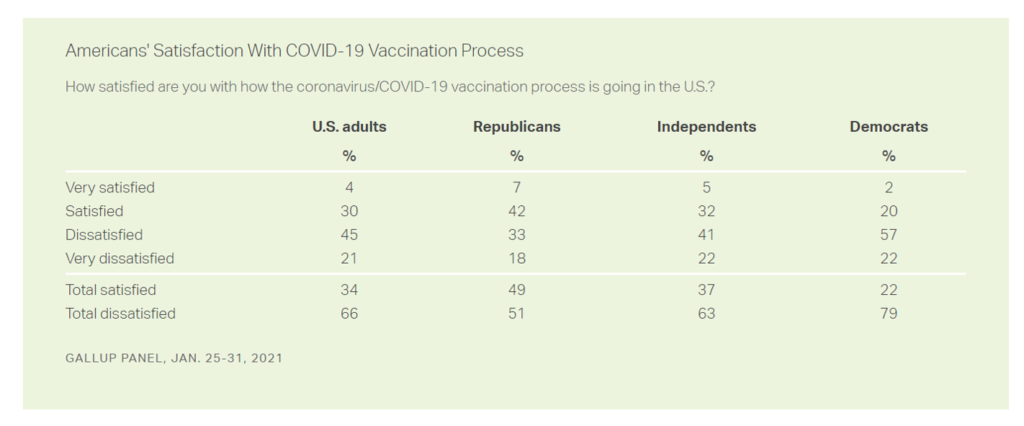 Overall, 66% of people are dissatisfied (NET, very dissatisfied + dissatisfied).
Overall, 66% of people are dissatisfied (NET, very dissatisfied + dissatisfied).
These feelings vary by the person’s party ID.
Among Democrats, 91% of people were willing to receive the COVID-19 vaccine, with 79% dissatisfied with the rollout.
Only one-half of Republicans were seeking the vaccine, and the same percentage — 51% of people — were dissatisfied with the implementation.
61% of Independents were willing to get the COVID-19 shot, with 63% dissatisfied with implementation of vaccines.
Roughly the same percentages of White and Non-White adults were willing to receive the vaccine or had already received it (71% and 72%), and slightly more women than men (72% women compared with 69% men).
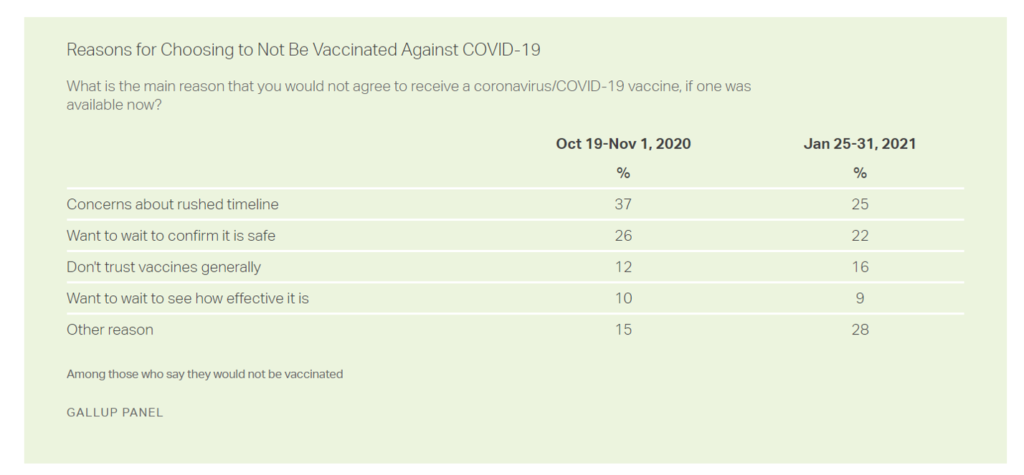 Among the 29% of people in the U.S. choosing not to get a COVID-19 vaccine, key reasons included:
Among the 29% of people in the U.S. choosing not to get a COVID-19 vaccine, key reasons included:
- Concerns about the rushed timeline (that is, believing that Operation “Warp Speed” had worrisome risks due to perceived fast-tracking of vaccine development);
- Wishing to wait and follow others receiving the vaccine to confirm it is safe; and,
- Generally not trusting vaccines.
In the Gallup study, the proportion of people citing “other reasons” for not wanting a vaccine rose from 15% in latter October 2020 to 28% at the end of January; these reasons included risks of COVID-19 being “overblown,” peoples’ belief that they already carried virus antibodies, concerns about adverse reactions to vaccination, and a general distrust of the U.S. government.
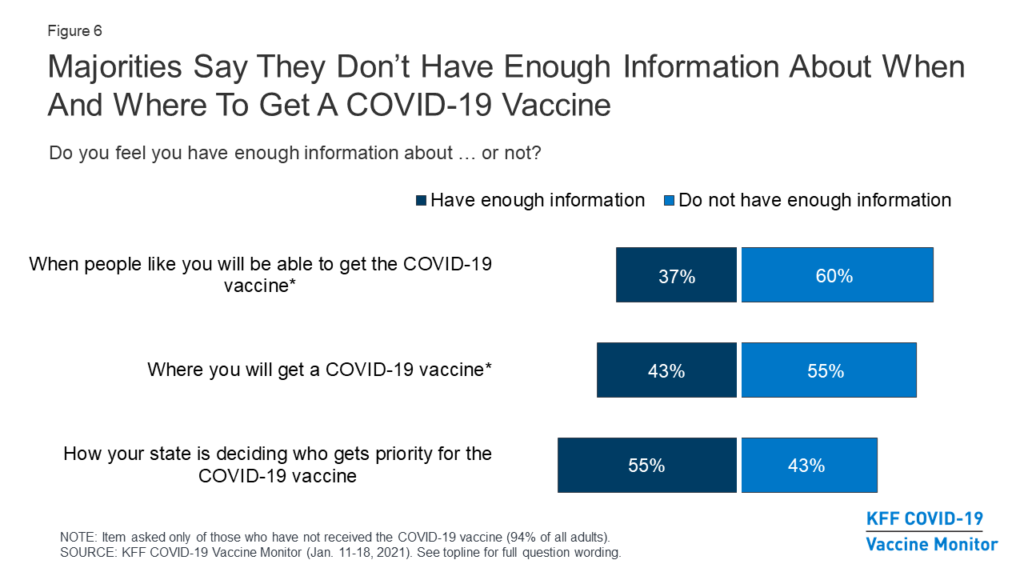 Health Populi’s Hot Points: Several other polls confirm Gallup’s findings that Americans are largely frustrated with the vaccine and vaccination process experienced in early 2021, such as a survey from Elon University as well as the COVID-19 Vaccine Monitor: January 2021 from Kaiser Family Foundation (KFF).
Health Populi’s Hot Points: Several other polls confirm Gallup’s findings that Americans are largely frustrated with the vaccine and vaccination process experienced in early 2021, such as a survey from Elon University as well as the COVID-19 Vaccine Monitor: January 2021 from Kaiser Family Foundation (KFF).
KFF’s poll conducted among 1,563 U.S. adults 18 years of age and older between January 11-18, 2021, found that two-thirds of people said the federal government was doing a fair or poor job distributing the COVID-19 vaccines to the states. KFF also found partisan differences as Gallup did, as more Democrats thought the federal government was doing a poor job compared with Republican partisans.
But Democrats are optimistic that under President Biden, vaccine distribution will improve.
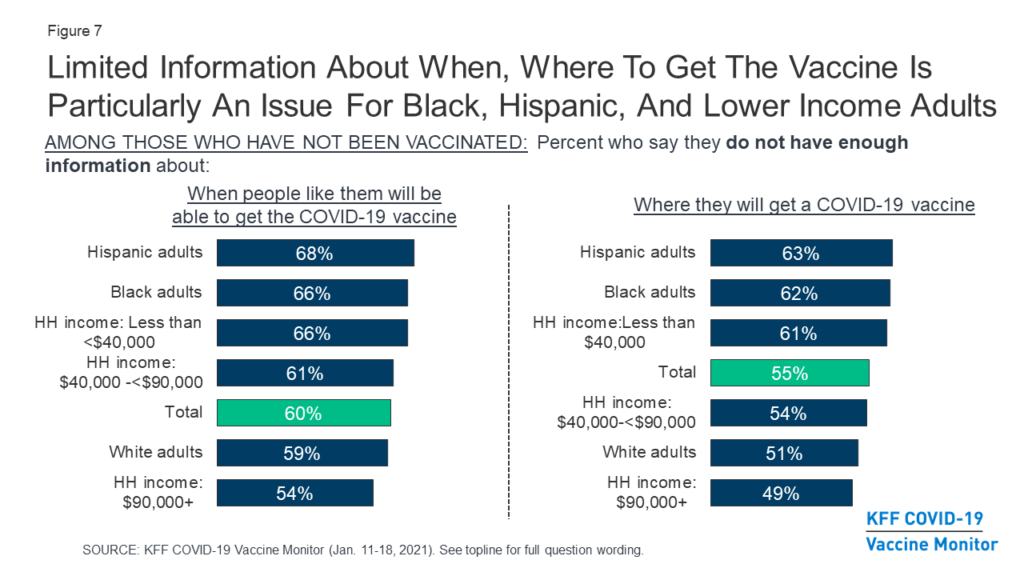 Most people who had not yet received a vaccine (94% of folks in the KFF study) reported a lack of information regarding when or where they would eventually get their shot.
Most people who had not yet received a vaccine (94% of folks in the KFF study) reported a lack of information regarding when or where they would eventually get their shot.
More Black and Hispanic consumers versus Whites said they did not have sufficient information about vaccines.
The last chart details data based on demographics regarding peoples’ access to information on their personal accessibility to COVID-19 vaccines. There continue to be disparities between White and Non-White health citizens for information on vaccinations, as well as a gap for people earning lower household incomes (under $40,000).
One contributing social determinant of health limiting some peoples’ access to vaccines is lack of broadband. Connecting online for signing up for vaccination, and accessing information about vaccination availability and scheduling, has become the primary on-ramp to getting a coronavirus shot. But as this research published by NPR explained, “No internet, no vaccine.”


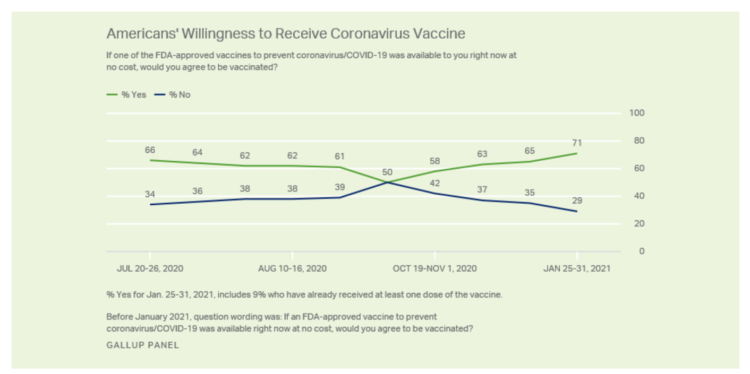


 I'm in amazing company here with other #digitalhealth innovators, thinkers and doers. Thank you to Cristian Cortez Fernandez and Zallud for this recognition; I'm grateful.
I'm in amazing company here with other #digitalhealth innovators, thinkers and doers. Thank you to Cristian Cortez Fernandez and Zallud for this recognition; I'm grateful. Jane was named as a member of the AHIP 2024 Advisory Board, joining some valued colleagues to prepare for the challenges and opportunities facing health plans, systems, and other industry stakeholders.
Jane was named as a member of the AHIP 2024 Advisory Board, joining some valued colleagues to prepare for the challenges and opportunities facing health plans, systems, and other industry stakeholders.  Join Jane at AHIP's annual meeting in Las Vegas: I'll be speaking, moderating a panel, and providing thought leadership on health consumers and bolstering equity, empowerment, and self-care.
Join Jane at AHIP's annual meeting in Las Vegas: I'll be speaking, moderating a panel, and providing thought leadership on health consumers and bolstering equity, empowerment, and self-care.